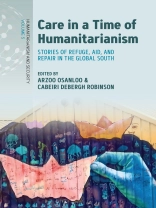The vast majority of forced migrants & refugees seek shelter and respite in countries of the Global South, where humanitarian spaces and practices of care are no exceptions to international humanitarianism but rather part of a project founded on hybrid forms of care that include local and vernacular practices. Care in a Time of Humanitarianism presents complex histories of forced migration and humanitarianism in an accessible way. It applies a comparative approach to highlight the diverse cultural and religious traditions of care that are adopted across the Global South for the “distant others”.
Inhaltsverzeichnis
List of Illustrations
Acknowledgements
Introduction: Care in a Time of Humanitarianism: Stories of Refuge, Aid, and Repair in the Global South
Arzoo Osanloo and Cabeiri de Bergh Robinson
Part I: Refuge, Law, and Empire in the Global South
Chapter 1. Patriation: Conceptualizing Migration after Empire
Pamela Ballinger
Chapter 2. Staging Filipino Hospitality: Transitional Intimacies of Jewish Refuge in the Commonwealth Philippines
James Pangilinan
Chapter 3. Burma Evacuees: R. Sanyassiah, Post-war Return, and Displacement in Modern South Asia
Emma C. Meyer
Chapter 4. Khao-i-Dang Refugee Camp: Local Hosts and Hauntings of the Third Indochina War in a Transit Zone
Khathaleeya Liamdee
Chapter 5. A ‘Lucky Escape’: Ethnic Cleansing and What Happens When International Humanitarianism Fails
Kathie Friedman-Kasaba
Chapter 6. Benevolent Arts: The Persistence of Mercy in Humanitarian Logics
Arzoo Osanloo
Part II: Aid, Intimacy, and Humanitarian Praxis
Chapter 7. Humanitarian Departures: Reflections of a Refugee Aid Worker
Ilana Feldman
Chapter 8. Quiet Aid: Barbara Schöfnagel’s Private Humanitarianism in the Socialist Gray Area (and What Else the Global East Can Teach Us)
Cristian Capotescu
Chapter 9. Yūsuf’s Struggle: Negotiating Development and Charity in a Palestinian Refugee Camp
Gözde Burcu Ege
Chapter 10. “They are Muhajir, We are Ansar:” Godforsakenness at the Myanmar-Bangladesh Border
Tanzeen Rashed Doha
Chapter 11. “We’re All Humanitarians”: International Humanitarian Organizations, Islamist Service Societies, and the Practice of ‘Humanitariyan Jihad’ in Kashmir
Cabeiri de Bergh Robinson
Part III: Repair in a World of Care
Chapter 12. Red Coat, Denim Shirt: Conceptualizing Displacement Across Generations
Rawan Arar
Chapter 13. The Barrette: Unlikely Humanitarian Images and Practices of Repair
Jenna Grant
Chapter 14. Memoir and a Sinking Ship: Reconstituting Sovereignty through Refugee Narratives
Megan Butler
Chapter 15. The Gift of Food: An Islamic Ethics of Care
Amira Mittermaier
Chapter 16. Mothering the Dead: Care Beyond Life in Kurdistan
Mediha Sorma
Chapter 17. Unintended Consequences: Debating the Protection of Cultural Heritage During Humanitarian Crises
Stephanie Selover
Conclusion: Concluding Conversation: A Global South’s Lessons in Humanitarianism
Arzoo Osanloo & Cabeiri de Bergh Robinson
Appendix I: Pedagogical Supplement
Arzoo Osanloo & Cabeiri de Bergh Robinson
Über den Autor
Cabeiri de Bergh Robinson is Associate Professor of International Studies and Anthropology at the University of Washington. She co-edited The Palgrave Handbook of New Directions in Kashmir Studies (Palgrave, 2023), and is the author of Bernard Cohn Book Prize winner Body of Witness, Body of Warrior: Refugee Families and the Making of Kashmiri Jihadists (University of California Press, 2013).












